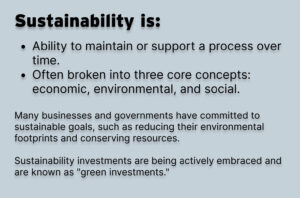Role of sustainability in policymaking process
Governments & organisations that adopt sustainable policies are better equipped to handle global challenges

 In general, sustainability refers to the ability to maintain or support a process continuously over time. In politics, sustainability seeks to prevent the depletion of natural or physical resources to ensure that it is available for the long term.
In general, sustainability refers to the ability to maintain or support a process continuously over time. In politics, sustainability seeks to prevent the depletion of natural or physical resources to ensure that it is available for the long term.
How Sustainability Helps in the Policymaking Process
Sustainability is a core principle in modern policymaking. It ensures that policies balance economic growth, social well-being and environmental protection for long-term benefits. It helps governments, institutions and businesses create policies which are resilient, future-proof and equitable. Some of the key points include:
- Acts as a guiding framework in policy making by ensuring that short-term policies do not detriment long-term policies. This leads to:
- Reducing negative environmental and social impact on policies
- Positioning policies with global goals like the SDGs etc.
- Safeguarding the efficiency of resources
For example, cities can support economic development by adopting sustainable urban planning policies to reduce carbon footprints.
- Influences key policy areas to include green growth and sustainable development by:
- Creating green jobs and promoting sustainable industries
- Supporting circular economy models (recycle, reuse and reduce)
- Boosting renewable energy investments over fossil fuels
For example, The National Solar Mission in India attempts to increase solar energy capacity while reducing dependency on coal.
- Encourages governance and institutional policy through long-term planning by:
- Reinforcing public-private partnerships for sustainable solutions
- Safeguarding evidence-based and transparent policy decisions
- Supporting participatory governance involving citizens in decision-making
For example, the integration of sustainability practices into urban development in the Smart Cities Mission in India.
- Addressing environmental policy to include climate change and natural resources by:
- Protecting natural resources from over-exploitation
- Fostering carbon pricing, green initiatives and reaching emission-reducing targets
- Formulating laws on pollution control, water management and biodiversity conservation
For example, adapt the Paris Agreement that influences national policies for carbon neutrality and emission reduction.
- Addressing equity and inclusion through social policies by:
- Formulating gender-sensitive and inclusive policies
- Promoting sustainable housing, healthcare and education access
- Supporting socio-economic policies which include marginalised communities
For example, through microfinance and clean energy initiatives encourage sustainable rural development programs that focus on women’s empowerment.
Challenges and Probable Solutions
Challenge 1: Ineffective policy implementation
Probable Solution: Strengthen monitoring and evaluation mechanisms
Challenge 2: Lack of funding
Probable Solution: Encourage green finance and sustainability-linked investments
Challenge 3: Short-term political focus
Probable Solution: Focus on long-term impact assessments for policies
Challenge 4: Resistance from industries
Probable Solution: Introduce incentives for businesses to adopt green practices
 If well understood and adapted, sustainability can ensure that policies balance economic, social and environmental goals. It can also help governments create resilient, future-ready strategies that address climate change, social inequalities and economic stability. Sustainability is the future of policymaking. Governments and organisations that adopt sustainable policies are better equipped to handle global challenges and improve citizens’ quality of life.
If well understood and adapted, sustainability can ensure that policies balance economic, social and environmental goals. It can also help governments create resilient, future-ready strategies that address climate change, social inequalities and economic stability. Sustainability is the future of policymaking. Governments and organisations that adopt sustainable policies are better equipped to handle global challenges and improve citizens’ quality of life.
Read other articles by the author:





